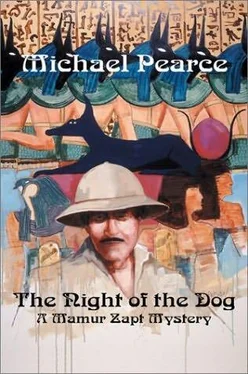Michael Pearce - The Mamur Zapt and the Night of the Dog
Здесь есть возможность читать онлайн «Michael Pearce - The Mamur Zapt and the Night of the Dog» — ознакомительный отрывок электронной книги совершенно бесплатно, а после прочтения отрывка купить полную версию. В некоторых случаях можно слушать аудио, скачать через торрент в формате fb2 и присутствует краткое содержание. Жанр: Исторический детектив, на английском языке. Описание произведения, (предисловие) а так же отзывы посетителей доступны на портале библиотеки ЛибКат.
- Название:The Mamur Zapt and the Night of the Dog
- Автор:
- Жанр:
- Год:неизвестен
- ISBN:нет данных
- Рейтинг книги:3 / 5. Голосов: 1
-
Избранное:Добавить в избранное
- Отзывы:
-
Ваша оценка:
- 60
- 1
- 2
- 3
- 4
- 5
The Mamur Zapt and the Night of the Dog: краткое содержание, описание и аннотация
Предлагаем к чтению аннотацию, описание, краткое содержание или предисловие (зависит от того, что написал сам автор книги «The Mamur Zapt and the Night of the Dog»). Если вы не нашли необходимую информацию о книге — напишите в комментариях, мы постараемся отыскать её.
The Mamur Zapt and the Night of the Dog — читать онлайн ознакомительный отрывок
Ниже представлен текст книги, разбитый по страницам. Система сохранения места последней прочитанной страницы, позволяет с удобством читать онлайн бесплатно книгу «The Mamur Zapt and the Night of the Dog», без необходимости каждый раз заново искать на чём Вы остановились. Поставьте закладку, и сможете в любой момент перейти на страницу, на которой закончили чтение.
Интервал:
Закладка:
As soon as they began to walk along the shops Owen was very glad that she had come. She addressed herself to the task with her usual imperiousness and dragged Owen and Mahmoud along in her wake. She entered into technical discussions with the shopkeepers in a way totally beyond the capacity of Owen and Mahmoud, explaining that while she normally wore only French perfume, she was considering experimenting with a combination of French and Arab scents: “une vraie caireenne, n’est-ce pas?” She treated coldly all attempts to dab the scent on her own sleeve, rejected any suggestion that it could suitably be tried out on Owen and Mahmoud, and insisted that it be tested on a woman, an assistant, perhaps, or, preferably, the shopkeeper’s wife, a suggestion which, with its hint of superiority, would have had shopkeepers in the more Westernized parts of the city grovelling but was treated simply commercially in the bazaar.
There were three Coptic scentmakers in the bazaar. One was an elderly, rather exhausted man who was unable to produce either assistant or wife and had to borrow a lady from his neighbour for the purpose. One was a middle-aged man, rather corpulent, who sent a message into the depths behind his recess which finally produced an abashed female servant; and one was a spare man in young middle age who had his wife helping him in the shop. She was used to helping with such requests and come forward at once when asked.
Zeinab spent a lot of time with this shopkeeper. Several of his perfumes seemed promising and in the end she took away samples in three small bottles and promised that she would return when she had tried them out. She asked the shopkeeper’s name so that she would know to whom to send her servant. It was Zoser.
Zoser served her politely but with an air of detachment, as if his mind was on higher things. There was an ascetic quality about him. He gave the impression that he had come straight from fasting; and there was a mild hint of irritation at his fast being interrupted.
At the last moment Zeinab dithered. She wanted to try just once again a perfume she had already rejected. When Zoser dabbed a little on his wife’s sleeve she took the sleeve and held it up to her nose. The wife obligingly lifted her arm and for the first time there was a flash of something pale, as if to show that there really was flesh and blood beneath the shapeless black garment.
“No,” said Zeinab, “no, I think I was right after all. I’ll just take these.”
They continued on along the line of booths, each with its owner sitting on the counter among his stained, dirty jars like some vast black spider, past the long, carpet-covered benches in front of them with the rows of men drinking coffee and smoking and talking, past the assorted smells of rose and jasmin, amber and banana, past the odd little restaurants with their grand brass jugs of hot water, their servants hurrying with coffee in glasses to some merchant about to strike a deal, past all this and then suddenly through the arch of the Bab es Zuweyla with its two soaring and fantastic minarets and out once more into the Tentmakers’ Bazaar with its donkey-saddles of red brocade and its camel-trappings adorned with cowries and little bits of looking-glass, its gaily-striped awnings and brilliant tent linings.
With its crowds, too. Owen loved the bustle of the bazaars, of the whole native city, in fact; but after you had spent some time in them, especially when it was as hot as this, you felt an overwhelming need for space and air, and after forcing their way through the blocked thoroughfares of the Tentmakers’ Bazaar they were glad to emerge into the more open streets. Mahmoud summoned an arabeah, one of the two-horse kind, and they sank into it gratefully.
Zeinab agreed that she would like a coffee and Mahmoud wanted to talk about what they had seen, so they stopped the arabeah when they reached the Ismailiya Quarter with its more Westernized restaurants into which women could go, and got out. It was late in the afternoon, almost evening by now, and the restaurants were beginning to fill up as people emerged from their siestas and began to promenade the streets. The shops took on a new lease of life, the street-sellers, with their lemonade and nougat, ostrich feathers, mummy-beads and scarabs, carnations and roses, and the street-artists, with their boa-constrictors and baboons, took new heart, and the city in general resumed its normal manic rhythm. They found a restaurant in a side street, where they would be pestered less, and took an outside table.
“Of the three, he’s the most likely,” said Mahmoud.
“Yes, but how certain are you that it’s one of the three? How certain are you in the first place that it’s a scentmaker?”
“Not at all,” Mahmoud confessed.
“I mean, it’s a brilliant deduction,” said Owen, “but it’s just a deduction.”
“Just a deduction?” said Mahmoud, a little sharply.
“There isn’t any real evidence.”
“There is real evidence but not much of it. So you’ve got to use what there is. Hence deduction.”
Owen was silent. He was tempted to ask if Mahmoud had learned that in college. Mahmoud, unlike Owen, had been trained for the job he was doing and sometimes reminded Owen of the fact. Owen did not like being reminded that he was, so far as police work was concerned, an amateur.
“Is there any corroborative evidence?” he asked.
He rather distrusted Gallic logic. Brilliant, yes, but was it sound? The Parquet lawyers, French-trained and French in style, had a name-among the English-for unreliability. Sometimes they homed in on the right conclusion with remarkable speed; sometimes they missed the point altogether.
“A bit,” said Mahmoud. “Three other people noticed the woman. One of them remarked on the scent.”
“Did they see her with the man?”
“Two of them did, including one who noticed the scent.”
“Anyone get a good look at him?”
“No. None of them would be able to identify him. Except as a Copt, that is. They’d all noticed that.”
“They would!”
“Yes. You’d prefer it not to be a Copt, wouldn’t you?”
“Just at the moment I would.”
“It’s rather pointing that way, though.”
“What else have you found out?”
“Nothing to link Zoser directly with the Zikr. One person thinks he saw him there. That was earlier in the evening, though.”
“Have you checked whether he was in his shop?”
“Yes. He wasn’t.”
“Have you asked him why?”
“Haven’t asked him anything yet. I was hoping for a positive identification. I don’t suppose-?”
Owen shook his head.
“No,” he said, “I didn’t see him.”
Mahmoud sighed.
“I was afraid of that,” he said. “That leaves us with Miss Postlethwaite.”
“That girl!” said Zeinab.
“Yes. You see,” said Mahmoud, turning to her, “she was the only one who really saw them.”
“Notices everything, doesn’t she?”
“Yes,” said Mahmoud enthusiastically. “She’s an extraordinarily good observer.”
Something must have told him that he’d not said quite the right thing, for he looked at Zeinab uneasily afterwards. Mahmoud stood a little in awe of Zeinab. It was partly her social position, partly her father, the formidable Nuri Pasha. Mahmoud detested everything that Nuri stood for: the old, near-feudal Egypt, with its hereditary great landlords, of whom Nuri was one; court-based politics, in which Nuri was adept; the power of the old order to block and frustrate all attempts at reform. But although he looked down on Nuri he also looked up at him, and because of that Nuri had a unique ability to touch Mahmoud on the raw. Something of all that had rubbed off on Zeinab, although Zeinab was Nuri’s daughter only by a slave girl, a well-known courtesan, who had had mind enough of her own to refuse to join Nuri’s harem. That was another thing which made Mahmoud uneasy, for modern and emancipated though he was, he could not completely shake off the attitudes and sexual constraints of the old, Islamic society. He even felt slightly awkward sitting out with her in a public place having coffee.
Читать дальшеИнтервал:
Закладка:
Похожие книги на «The Mamur Zapt and the Night of the Dog»
Представляем Вашему вниманию похожие книги на «The Mamur Zapt and the Night of the Dog» списком для выбора. Мы отобрали схожую по названию и смыслу литературу в надежде предоставить читателям больше вариантов отыскать новые, интересные, ещё непрочитанные произведения.
Обсуждение, отзывы о книге «The Mamur Zapt and the Night of the Dog» и просто собственные мнения читателей. Оставьте ваши комментарии, напишите, что Вы думаете о произведении, его смысле или главных героях. Укажите что конкретно понравилось, а что нет, и почему Вы так считаете.












